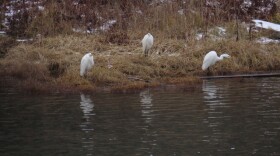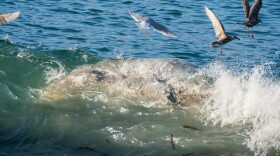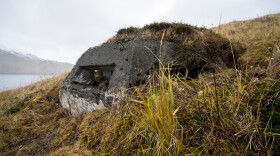-
The Bureau of Ocean Energy Management is evaluating whether to hold a first-of-its-kind lease sale for seabed mineral development in federal waters off Alaska, and seeking information and input to help decide if it should move forward.
-
For this episode of Island Interviews, KUCB's Kanesia McGlashin-Price spoke with Unalaska naturalist and birder Suzi Golodoff, who spotted the three visiting birds. Golodoff explains why this is such a rare event and how a powerful typhoon may have swept these Asian birds across the Pacific.
-
A dead humpback whale was spotted in Unalaska Bay on Dec. 4, the third reported dead whale to wash up on the island since Oct. 16.
-
Residents reported changing where they pick berries and plants, and where they hunt birds and fish. Some have stopped harvesting salmon and marine invertebrates entirely.
-
For this episode of “Island Interviews,” KUCB’s Sofia Stuart-Rasi sat down with Faith Green, project manager on the FUDS research project, to discuss what the team has learned so far and why this research is important for everyone who calls Unalaska home.
-
The Alaska Emergency Operations Center mistakenly sent an evacuation order to Unalaskans after a mid-July earthquake due to confusion over geography, a state emergency official said July 28.
-
A group of scientists wrapped up a deep-sea expedition in the western Aleutians this summer. They explored parts of the ocean floor no human has ever been before, and they found huge populations of healthy coral and sponges.
-
Researchers are finding the poisonous toxin throughout the year, and in animals away from the ocean.
-
The Aleut Corp., Adak’s regional Native corporation, signed an agreement in May 2025 to lease 3,500 acres to Pacific H2, an Oregon-based energy company. The 90-year lease allows Pacific H2 to build wind turbines that would power a permanently docked green ammonia plant in Adak’s harbor. The facility would be Alaska’s first green ammonia plant.
-
Unalaska is famous for its deep-water port that doesn't freeze in the winter, but the island hasn’t always been this warm.
-
Ten fur seals and hundreds of fish washed up dead on a Pribilof beach last year. New research links the die-off to warming oceans.
-
There are no bears on most of the Aleutians Islands today. But a new study reveals that bears likely lived in Unalaska and Amaknak Island thousands of years ago, solving a decades-long archaeological mystery.
















